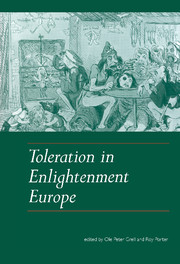Book contents
- Frontmatter
- Contents
- List of contributors
- Preface
- 1 Toleration in Enlightenment Europe
- 2 Toleration and the Enlightenment Movement
- 3 Multiculturalism and Ethnic Cleansing in the Enlightenment
- 4 Intolerance, the Virtue of Princes and Radicals
- 5 Spinoza, Locke and the Enlightenment Battle for Toleration
- 6 Toleration and Enlightenment in the Dutch Republic
- 7 Toleration and Citizenship in Enlightenment England: John Toland and the Naturalization of the Jews, 1714–1753
- 8 Citizenship and Religious Toleration in France
- 9 A Tolerant Society? Religious Toleration in the Holy Roman Empire, 1648–1806
- 10 Enlightenment in the Habsburg Monarchy: History of a Belated and Short-Lived Phenomenon
- 11 Toleration in Eastern Europe: the Dissident Question in Eighteenth-Century Poland–Lithuania
- 12 Toleration in Enlightenment Italy
- 13 Inquisition, Tolerance and Liberty in Eighteenth-Century Spain
- Index
Preface
Published online by Cambridge University Press: 03 February 2010
- Frontmatter
- Contents
- List of contributors
- Preface
- 1 Toleration in Enlightenment Europe
- 2 Toleration and the Enlightenment Movement
- 3 Multiculturalism and Ethnic Cleansing in the Enlightenment
- 4 Intolerance, the Virtue of Princes and Radicals
- 5 Spinoza, Locke and the Enlightenment Battle for Toleration
- 6 Toleration and Enlightenment in the Dutch Republic
- 7 Toleration and Citizenship in Enlightenment England: John Toland and the Naturalization of the Jews, 1714–1753
- 8 Citizenship and Religious Toleration in France
- 9 A Tolerant Society? Religious Toleration in the Holy Roman Empire, 1648–1806
- 10 Enlightenment in the Habsburg Monarchy: History of a Belated and Short-Lived Phenomenon
- 11 Toleration in Eastern Europe: the Dissident Question in Eighteenth-Century Poland–Lithuania
- 12 Toleration in Enlightenment Italy
- 13 Inquisition, Tolerance and Liberty in Eighteenth-Century Spain
- Index
Summary
These essays have emerged out of a conference held in Corpus Christi College, Cambridge, 17–19 September 1997, which was the culmination of a series of academic symposia which began in 1988 during the William and Mary Tercentenary, and which has resulted in the publication of two previous volumes: O. P. Grell, J. I. Israel and N. Tyacke (eds), From Persecution to Toleration: The Glorious Revolution and Religion in England (1991); and O. P. Grell and Bob Scribner (eds), Tolerance and Intolerance in the European Reformation (1996).
The issue of toleration still remains as important today as it was during the Enlightenment. The continuous conflict in the former Yugoslavia, with its horrific examples of intolerance between different religious and ethnic groups, which started in Bosnia and has now moved on to Kosovo, reminds us that toleration cannot simply be a passive response, something akin to indifference. We are reminded that, if it is to have any meaning, toleration will occasionally mean active intervention to protect those who are exposed to intolerance and persecution. Edmund Burke's 200-year-old dictum: ‘For evil to succeed it only takes good men to do nothing’ remains as relevant as ever.
The editors are grateful to all the contributors for their cooperation in transforming conference papers into published essays, aided by constructive referees' reports provided by Cambridge University Press, and the encouragement of Richard Fisher of the Press.
We are beholden to the William and Mary History of Toleration Committee and the British Academy for their generous financial support of the conference which made this volume possible. For administrative aid, the editors wish to thank Frieda Houser.
- Type
- Chapter
- Information
- Toleration in Enlightenment Europe , pp. ix - xPublisher: Cambridge University PressPrint publication year: 1999

